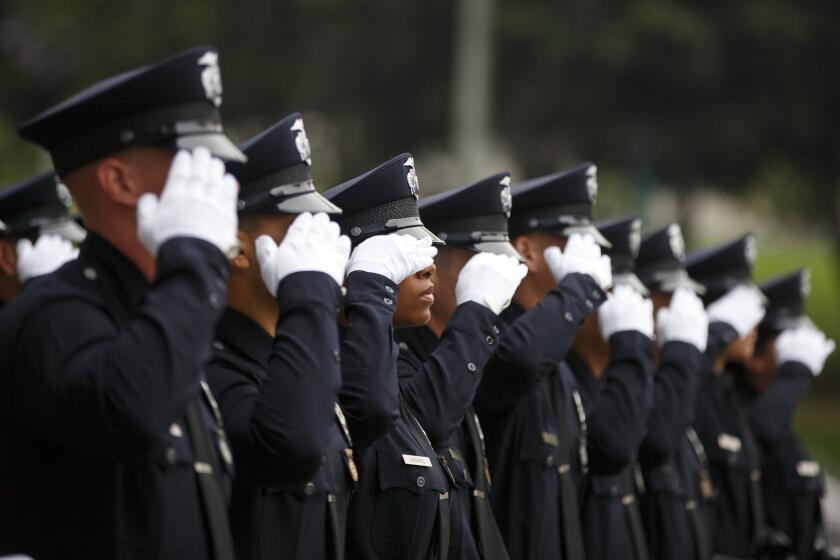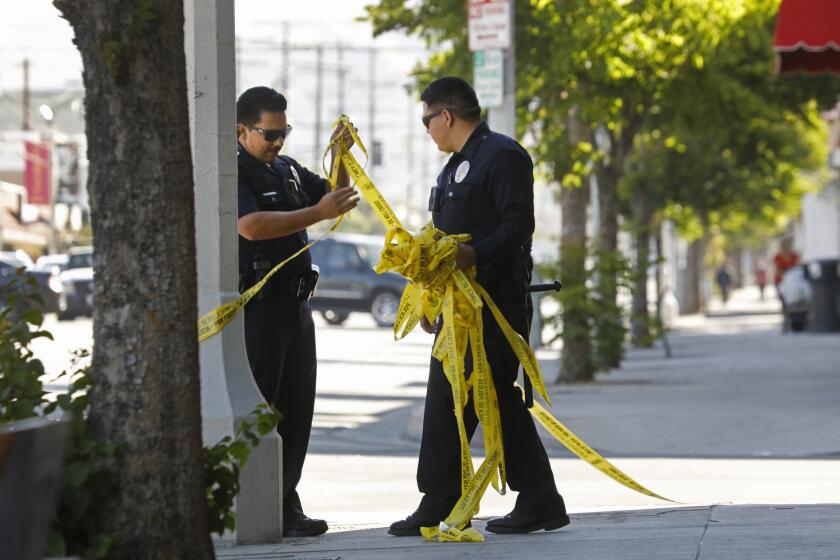LAPD chief: Too many officers opened fire in fatal South L.A. shooting last year

Several Los Angeles police officers were justified when they shot at and killed a man who brandished a handgun, but six of their colleagues broke department policy by joining in the barrage of gunfire last July, according to a police oversight panel.
The civilian Police Commission found late last month that four of the 10 officers — Luis Avalos, Garrett Vanhooser, Christopher Gonzalez and Chad Heistermann — who opened fire on Rudolfo Torres were within policy. The commission voted at that time to approve a report by Police Chief Michel Moore, summarizing an internal investigation of the incident.
But the chief’s report found that the deadly force used by the rest of the officers who opened fire during the confrontation a year ago — Christopher Burke, Jose Rodriguez, Kyle Bender, James Stea, Israel Florez and Chad Fillinger — “was not proportional, objectively reasonable, or necessary.”
Footage shows Los Angeles police shootings in South L.A.
In fact, the report on Torres’ death weighed whether the incident might have been a case of “contagious fire” — a phenomenon in which an officer mistakes colleagues’ shots as coming from a suspect, prompting them to open fire.
In all, 31 shots were discharged, with officers firing between one and five shots each, the report said. Some officers who were present did not fire.
While acknowledging that the shooting unfolded amid “a difficult situation,” Moore wrote in a report that the designated cover officers at the scene were “better positioned to address the lethal threat” than some of the officers who ultimately fired. During such encounters, only certain officers are assigned the role of cover officers.
Moore also agreed with the majority of an internal review board that concluded a supervisor at the scene, Sgt. Burke, didn’t need to fire his service weapon and would have been better served by staying back and assigning clear roles to the other officers.
Though it concluded that the four officers’ shots were in policy, the board took into account the “number of officers that discharged their service pistols, as well as the number of rounds fired,” according to Moore’s report.
The shooting occurred on the night of July 2, 2022, when Newton Division gang officers encountered Torres in the area of 37th Street and Maple Avenue.
While speaking to Torres, who appeared to be under the influence of drugs, officers became convinced he was armed and ordered him to take his hands out of his pockets, police said. Further raising their suspicions, officers said, Torres was acting fidgety and was wearing an oversized, baggy sweatshirt on a warm night.
According to the chief’s report, one of the officers recognized Torres from a previous run-in as a member of the 36th Street gang who went by the nickname “Marbles.” The decades-old gang operates in the surrounding area, which is sometimes called the “Low Bottoms,” police said.
When they ordered him to stop, Torres ignored the command and started walking away, prompting a surreal, slow-motion pursuit through nearby streets, with officers trailing several feet behind and using a patrol vehicle as cover.
After following Torres on foot for several blocks, officers tried to apprehend him. Edited police body camera video shows that officers shot him once with a hard foam projectile, sending him tumbling. As he fell, a gun he had apparently been holding under his coat clattered to the ground, according to the report. When he picked it back up, the officers opened fire, the report says.
Officers involved gave differing accounts of whether they saw Torres point the gun in their direction or simply raise it.
The 30-year-old was pronounced dead at a hospital.
“Regardless of whether Torres was raising the handgun or pointing it, the board opined that it was reasonable for the officers to believe that he had the present ability, opportunity, and apparent intent to immediately cause death or serious bodily injury to them and that his action had to be instantly confronted and addressed,” Moore wrote in his report.
According to the report, police recovered a loaded .40-caliber pistol with no serial number and an extended magazine with 31 bullets. They also recovered another extended magazine, a .9mm, AR-style pistol and a 50-round drum magazine inside a backpack Torres was carrying.
Though the chief’s report concluded that some officers were justified in using deadly force against an armed suspect, it disapproved of some of the tactics employed leading up to the shooting.
Some of the officers who fired should have sought cover behind the patrol vehicle’s bulletproof doors, the report said. Other officers were cited for occasionally placing their fingers on the trigger of their guns — in violation of department policy that dictates officers should do so only when prepared to fire.
Echoing the review board, the report also faulted Burke for failing to take an “active leadership role.” Instead, the report said, the sergeant seemed “overly involved in Torres’ actions, which seemed to limit his ability to effectively manage his personnel.”
Toxicology results from an autopsy found the presence of alcohol, amphetamine and methamphetamine in Torres’ blood, according to the report.
Since the shooting, relatives of Torres have continued to question the officers’ motive for the stop.
Since the shooting, Torres’ brother, Javier, said he has heard from neighborhood residents who said his brother’s death was part of a larger pattern of profiling and harassment by Newton Division officers.
“There’s been a continuous targeting of Latino and African Americans in this community,” said Javier Torres, a high school teacher in Oakland. “It has been nonstop and I think since my brother’s killing, his murder by LAPD, we have seen many, many murders” by police.
Even though his brother was armed, Javier Torres said police could have done more to defuse the situation. His brother should have been arrested and “put through the process” rather than killed, he said.
He also questioned why officers fired so many shots in the encounter.
LAPD officials said during a presentation in April before the Police Commission that they have tried to address high-volume gunfire incidents by restricting the number of officers who can have their guns drawn during an encounter with a suspect.
Deputy Chief Marc Reina told commissioners at the time that the department is developing a new virtual reality training course for officers intended to “re-create” the stress levels of firing their weapons in a fast-changing environment where they have to account for countless factors.
In a separate investigation, the department late last month also cleared two officers who shot and killed an armed man in Pacoima last June after he allegedly tried to force someone out of a car at gunpoint.
Police received multiple 911 calls of an armed man pointing a gun at people in the area of Laurel Canyon and Van Nuys boulevards, according to the LAPD.
Officers Christopher Kliebert and Andrew Mejia were justified in using deadly force against 24-year-old Oscar Santiago, who brandished a gun at police a short time after the attempted carjacking. Police released video from the encounter.
A review board concluded that another officer in Kliebert’s and Mejia’s shoes would have also considered Santiago a threat, after he raised a gun in their direction. Police initially said that Santiago fired first, but a subsequent investigation revealed that officers were the first to shoot, according to a report.
More to Read
Sign up for Essential California
The most important California stories and recommendations in your inbox every morning.
You may occasionally receive promotional content from the Los Angeles Times.













